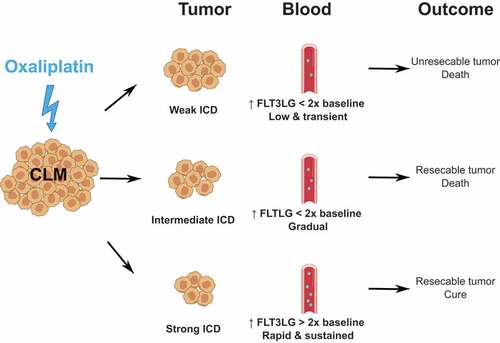Figures & data
Figure 1. Serum FLT3LG as a prognostic biomarker of ICD-induced systemic anticancer immunity in colorectal cancer
The level of circulating FLT3LG reflects a tumor-specific immune response invoked by first-line chemotherapy with oxaliplatin (OXA) in patients with colorectal cancer liver metastasis (CLM). Subjects could be segregated in 3 groups. First, patients in which OXA failed to convert CLM to resectable disease showed a limited (<2 fold baseline), slow and transient increase of serum FLT3LG. Second, some patients with technically resectable CLM presented a limited (<2 fold baseline), slow but gradual rise of FLT3LG. These two kinetics of serum FLT3LG reflected a bad prognosis with no survivors at censoring. In contrast, all patients of the third group, who remained alive after 8 to 12 years of follow-up after successful resection of CML exhibited a strong (>2 fold baseline), rapid and sustained elevation of serum FLT3LG. Thus, assessment of serum FLT3LG may be used to improve the selection of OXA-treated CLM patients for a curative-intent ablation procedure. FLT3LG, fms-related tyrosine kinase 3 ligand; ICD, immunogenic cell death.

